S E A?
Page 49
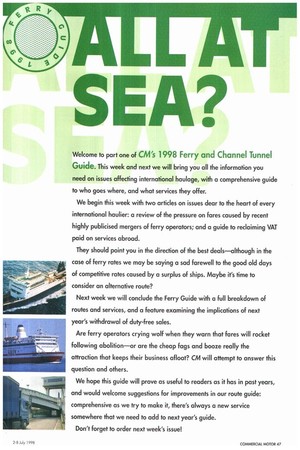
Page 50
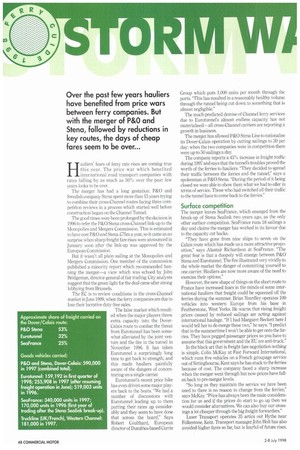
Page 51
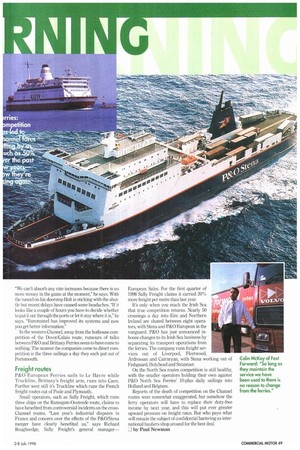
Page 52
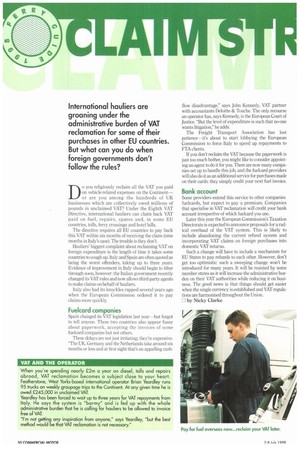
Page 53
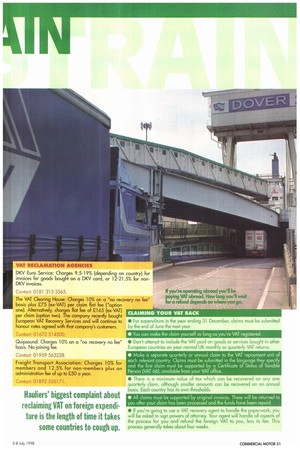
If you've noticed an error in this article please click here to report it so we can fix it.
Over the past few years hauliers have benefited from price wars between ferry companies. But with the merger of P&O and Stena, followed by reductions in key routes, the days of cheap fares seem to be over...
Hauliers' fears of ferry rate rises are coming true this year. The price war which benefited international road transport companies with rates falling by as much as 50% over the past few
years looks to be over.
The merger has had a long gestation. P&O and Swedish company Stena spent more than 15 years trying to combine their cross-Channel routes facing three competition reviews in a process which started well before construction began on the Channel Tunnel.
The good times were been prolonged by the decision in 1996 to refer the P&O/Stena cross-Channel link-up to the Monopolies and Mergers Commission. This is estimated to have cost P&O and Stena £75m a year, so it came as no surprise when sharp freight fare rises were announced in January soon after the link-up was approved by the European Commission.
But it wasn't all plain sailing at the Monopolies and Mergers Commission. One member of the commission published a minority report which recommended banning the merger—a view which was echoed by John Bridgeman, director-general of fair trading. City analysts suggest that the green light for the deal came after strong lobbying from Brussels.
The EC is to review conditions in the cross-Channel market in June 1999, when the ferry companies are due to lose their lucrative duty-free sales.
The false market which resulted when the major players threw extra capacity into the DoverCalais route to combat the threat from Eurotunnel has been somewhat alleviated by the joint venture and the fire in the tunnel in November 1996. It has taken Eurotunnel a surprisingly long time to get back to strength, and this made hauliers painfully aware of the dangers of concentrating on a single carrier.
Eurotunners recent price hike has even driven some major players back to the boats "We had a number of discussions with Eurotunnel leading up to them putting their rates up considerably and they seem to have done that across the board," Says Robert Coulthard, European director of Dumfries-based Currie Group which puts 1,000 units per month through the ports. "This has resulted in a reasonably healthy volume through the tunnel being cut down to something that is almost negligible."
The much-predicted demise of Channel ferry services due to Eurotunnel's almost endless capacity has not materialised—all cross-Channel carriers are reporting a growth in business.
The merger has allowed P&O Stena Line to rationalise its Dover-Calais operation by cutting sailings to 30 per day: when the two companies were in competition there were up to 50 sailings a day.
The company reports a 43% increase in freight traffic during 1997 and says that the tunnel's troubles proved the worth of the ferries to hauliers. "They decided to spread their traffic between the ferries and the tunnel, says a spokesman at P&O Stena. "During the period of it being closed we were able to show them what we had to offer in terms of service. Those who had switched all their traffic to the tunnel have to come back to the ferries."
Surface competition
The merger leaves SeaFrance, which emerged from the break-up of Stena Sealink two years ago, as the only other surface competition. SeaFrance runs 18 sailings a day and claims the merger has worked in its favour due to the capacity cut backs.
"They have gone from nine ships to seven on the Calais route which has made us a more attractive proposition." says Alastair Richardson at SeaFrance. "The great fear is that a duopoly will emerge between P&O Stena and Eurotunnel. The fire illustrated very vividly to the whole market the danger of committing yourself to one carrier. Hauliers are now more aware of the need to exercise their options."
However, the new shape of things on the short route to France have increased fears in the minds of some international hauliers that freight could be squeezed off the ferries during the summer. Brian Yeardley operates 100 vehicles into western Europe from his base in Featherstone, West Yorks. He warns that rising freight prices caused by reduced sailings are acting against international haulage. "If I had Margaret Beckett here I would tell her to de-merge these two," he says. "I predict that in the summertime I won't be able to get onto the ferries. They have pegged passenger prices so you have to assume that this government and the EL' are anti-truck."
In the black art that is freight fare negotiation nothing is simple. Colin McKay at Fast Forward International, which runs five vehicles on a French groupage service out of Sittingbourne, Kent says he has stuck to the ferries because of cost. The company faced a sharp increase when the merger went through but now prices have fallen back to pre-merger levels "So long as they maintain the service we have been used to there is no reason to change from the ferries," says McKay "Price has always been the main consideration for us and if the prices do start to go up then we would consider alternatives. We can also buy our crossings a lot cheaper through the big freight forwarders."
Laser Transport operates 35 artics out Hythe near Folkestone, Kent. Transport manager John Holt has also avoided higher fares so far, but is fearful of future rises. "We can't absorb any rate increases because there is no more money in the game at the moment," he says. With the tunnel on his doorstep Holt is sticking with the shuttle but recent delays have caused some headaches. "If it looks like a couple of hours you have to decide whether to put it out through the ports or let it stay where it is," he says. "Eurotunnel has improved its systems and now you get better information."
In the western Channel, away from the hothouse competition of the Dover/Calais route, rumours of talks between P&O and Brittany Ferries seem to have come to nothing. The nearest the companies come to direct competition is the three sailings a day they each put out of Portsmouth.
Freight routes P&O European Ferries sails to Le Havre while Truckline, Brittany's freight arm, runs into Caen. Further west still it's Truckline which runs the French freight routes out of Poole and Plymouth.
Small operators, such as Sally Freight, which runs three ships on the Ramsgate-Oostende route, claims to have benefited from controversial incidents on the crossChannel routes. "Last year industrial disputes in France and concern over the effects of the P&O/Stena merger have clearly benefited us," says Richard Rou,ghsedge, Sally Freight's general manager European Sales. For the first quarter of 1998 Sally Freight claims it carried 20% more freight per metre than last year.
It's only when you reach the Irish Sea that true competition returns. Nearly 50 crossings a day into Eire and Northern Ireland are shared between eight operators, with Stena and P&O European in the vanguard. P&O has just announced inhouse changes to its Irish Sea business by separating its transport operations from the ferries. The company runs freight services out of Liverpool, Fleetwood, Ardrossan and Cairnryan, with Stena working out of Fishguard, Holyhead and Stranraer.
On the North Sea routes competition is still healthy, with the smaller operators holding their own against P&O North Sea Ferries' 10-plus daily sailings into Holland and Belgium.
Reports of the death of competition on the Channel routes were somewhat exaggerated, but somehow the ferry operators will have to replace their duty-free income by next year, and this will put ever greater upward pressure on freight rates. But who pays what will remain the subject of confidential bartering as international hauliers shop around for the best deal.
by Paul Newman International hauliers are groaning under the administrative burden of VAT reclamation for some of their purchases in other EU countries. But what can you do when foreign governments don't follow the rules?
Do you religiously reclaim all the VAT you paid on vehicle-related expenses on the Continent— or are you among the hundreds of UK businesses which are collectively owed millions of pounds in unclaimed VAT? Under the Eighth VAT Directive, international hauliers can claim back VAT paid on fuel, repairs, spares and, in some F.:I.J countries, tolls, ferry crossings and hotel bills.
The directive requires all EU countries to pay back this VAT within six months of receiving the claim (nine months in Italy's case). The trouble is they don't.
Hauliers' biggest complaint about reclaiming VAT on foreign expenditure is the length of time it takes some countries to cough up. Italy and Spain are often quoted as being the worst offenders, taking up to three years. Evidence of improvement in Italy should begin to filter through soon, however: the Italian government recently changed its vm rules and now allows third-party agents to make claims on behalf of hauliers.
Italy also had its knuckles rapped several years ago when the European Commission ordered it to pay claims more quickly.
Fuelcard companies
Spain changed its VAT legislation last year—but forgot to tell anyone. These two countries also appear fussy about paperwork, accepting the invoices of some fuelcard companies but not others.
These delays are not just irritating; they're expensive. "The UK, Germany and the Netherlands take around six months or less and at first sight that's an appalling cash
flow disadvantage," says John Kennedy, VAT partner with accountants Deloitte & Touche. The only recourse an operator has, says Kennedy, is the European Court of Justice. "But the level of expenditure is such that no-one wants litigation," he adds.
The Freight Transport Association has lost patience—it's about to start lobbying the European Commission to force Italy to speed up repayments to ETA clients.
If you don't reclaim the VAT because the paperwork is just too much bother, you might like to consider appointing an agent to do it for you. There are now many companies set up to handle this job, and the fuelcard providers will also do it as an additional service for purchases made on their cards: they simply credit your next fuel invoice.
Bank account
Some providers extend this service to other companies fuelcards, but expect to pay a premium. Companies that specialise in VAT reclamation will credit your bank account irrespective of which fuelcard you use.
Later this year the European Commission's Taxation Directorate is expected to announce proposals for a radical overhaul of the VAT system. This is likely to include abandoning the current refund system and incorporating VAT claims on foreign purchases into domestic VAT returns.
Such a change will have to include a mechanism for EU States to pay refunds to each other. However, don't get too optimistic: such a sweeping change won't be introduced for many years. It will be resisted by some member states as it will increase the administrative burden on their VAT authorities while reducing it on business. The good news is that things should get easier when the single currency is established and VAT regulations are harmonised throughout the Union.
7Iby Nicky Clarke VAT AND THE OPERATOR
When you're spending nearly 2rn a year on diesel, tolls and repairs abroad, VAT reclamation becomes a subject close to your heart. Featherstone, West Yorks-based international operator Brian Yeardley runs 95 trucks on weekly groupage trips to the Continent. At any given time he is owed 2245,000 in unclaimed VAT.
Yeardley has been forced to wait up to three years for VAT repayments from Italy. He says the system is "barmy" and is fed up with the whole administrative burden that he is calling for hauliers to be allowed to invoice free of VAT.
"I'm not getting any inspiration from anyone," says Yeardley, "but the best method would be that VAT reclamation is not necessary."
VAT RECLAMATION AGENCIES DKV Euro Service: Charges 9.5-19% (depending on country) for I invoices for goods bought on a DKV card, or 12-21.5% for nonDKV invoices.
Contact' 0181 313 3565 no fee" The VAT Clearing House: Charges 10% on a "no recovery basis plus £75 (ex-VAT) per claim flat fee ("option one). Alternatively, charges flat fee of £165 (ex-VAT} per claim (option two). The company recently bought European VAT Recovery Services and will continue to honour rates agreed with that company's customers.
Contact: 01672 514500 Quipsound: Charges 10% on a "no recovery no fee" basis. No joining Fee.
Contact: 01959 563228.
Freight Transport Association: Charges 10% for members and 12.5% for non-members plus an administration fee of up to £50 a year.
Contact: 01892 526171.
CLAIMING YOUR VAT BACK
• For expenditure in the year ending 31 December, claims must be submitted by the end of June the next year.
• You can make the claim yourself as long as you're VAT registered.
• Don't attempt to include the VAT paid on rods or services bought in other • Make a separate quarterly or annual claim to the VAT repayment unit of each relevant country. Claims must be submitted in the language they specify and the first claim must be supported by a Certificate of Status of Taxable Person (VAT 66), available from your VAT office.
• There is a minimum value of tax which can be recovered on any one quarterly claim, although smaller amounts can be recovered on an annual basis, Each country has its own thresholds. European countries on your normal UK monthly or quarterly VAT returns.
• All claims must be supported by original invoices, These will be returned to you after your claim has been processed and the funds have been repaid.
• If you're going to use a VAT recovery agent to handle the paperwork, you will be asked to sign powers of attorney. Your agent will handle all aspects of the process for you and refund the foreign VAT to you, less its fee. This process generally takes about four weeks. Approximate share of freight carried on the Dover/Calais route: P&O Steno 53% Euroiunnel 32% SeaFrance 25% Goods vehicles carried: P&O and Steno, Dover-Calais: 590,000 in 1997 (combined total).
Eurotunnel: 159,192 in first quarter of 1998; 255,908 in 1997 (after resuming freight operation in June); 519,003 units in 1996.
Sealrance: 340,000 units in 1997; 170,000 units in 1996 (first year of trading after the Steno Sealink break-up).
Truckline (UK/French), Western Channel: 181,000 in 1997.












































































































